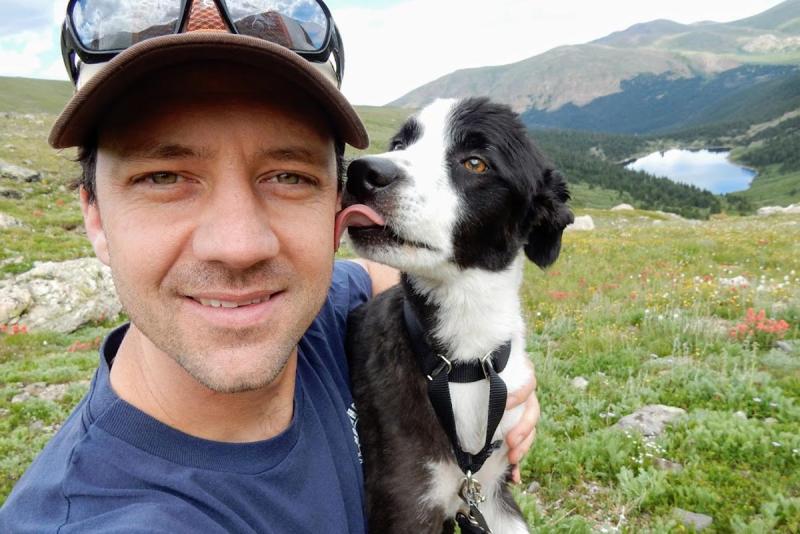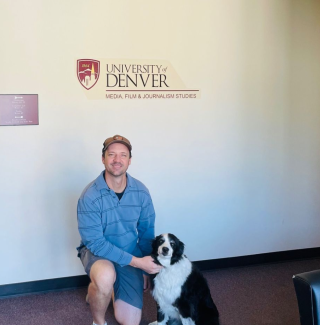MFJS Director of Technical Services Helps Faculty and Students Capture Storytelling Visions

Growing up in Denver, Ethan Crawford, director of technical services for the Department of Media, Film and Journalism Studies (MFJS), channeled his innate passion for storytelling into crafting “silly, little short claymations” using stop-action videography.
Now, that lifelong interest in both storytelling and technology has led to a career that combines both.
Crawford started at the University of Denver nearly 17 years ago as a digital instruction specialist in the Graduate School of Social Work, charged with helping faculty incorporate technology into their teaching.
“When I was hired, they made clear this was a tech position, not necessarily a creative one, but I found I actually have more impact that way,” Crawford said. “I really enjoy helping so many other people learn to use tech tools to make and publish great work.”
The position unexpectedly took him abroad on several occasions through grants from the Office of Internationalization to produce short documentaries about the work of faculty members teaching around the world from China to South Africa to Bosnia and Kenya.
Providing Multi-Faceted Services and Access
Crawford’s current role includes helping design, build and provide instructional content in the learning-management system Canvas, offering training and technical support and creating and managing media labs and studios where students produce podcasts and videos.
“We’ve got 25 computers in our computer labs that have to be set up, maintained and operated and a massive equipment checkout operation of thousands of inventory items from cameras to microphones to lighting equipment that I have to barcode, label, track and make available through an online checkout system,” Crawford said. He also provides access to virtual and physical spaces “making sure the doors unlock for the right people at the right time.”
During COVID-19, as MFJS’s sole designated essential employee—the only person given access to the building—Crawford worked tirelessly to keep the department afloat. “I was the one person on campus who had and provided access to this building and the one who still had to come to work,” he said.
“We had to convert all our checkout equipment to a mail-order system so I was in here packaging up FedEx boxes to send cameras all over the country. I usually hire student staff but everybody was home so it was a one-man show.”
Post shutdown, Crawford continues to pair students assigned to create films with a designated camera and training and helps them pursue extracurricular projects.
"I built our web platform called StoryLab to showcase student and faculty projects and allow students to practice journalism skills within classes," he said. "The platform enabled MFJS faculty to launch their own publishing projects like DU Media and Rocky Mountain Reverb."
Crawford hears from students and faculty members campuswide looking to acquire storytelling skills “in the form of training and access to our studios, production spaces and technical tools.”
Supporting Innovative Multimedia Teaching Applications
In 2020, the Graduate School of Social Work asked Crawford to help develop a course in digital storytelling for social justice and then teach a couple of sections last year. Subsequently he taught film and social media production courses in the MFJS department.
Sociology Professor Lisa Martinez reached out to Crawford for help with a course she teaches on immigration.
“We got her and her students set up with accounts on wevideo so her students could create three-minute videos around immigration and border issues,” Crawford says. “They did some amazing work! These students are coming in with some of these skills because they already create little stories on TikTok.”
Crawford recently received a request to contribute a digital poster project to a workshop on how to follow accessibility principles for people with disabilities when publishing multimedia material online. “There’s a real push on campus right now to make sure teachers are providing accessible content to students and we are teaching our students to use accessibility principles in all work they’re publishing.”
Last spring break Crawford accompanied Assistant Professor Joe Brown in a collaborative trip between the Graduate School of Social Work and MFJS to document the migration of sandhill cranes..
“We piled into a van and drove to Nebraska, got up at dawn and went down to the river to film these birds flying off as part of the largest bird migration in the country,” he said.
Instrumental in championing the recently enacted policy to give all students, faculty and staff members access to Adobe, Crawford is currently exploring with colleagues the possibility of incorporating core technology training into the new student orientation program at the James C. Kennedy Mountain Campus.
“When I step back, I realize that in many ways I have a dream job,” he adds. “It’s a real privilege to be at the center of operations for such a creative department and a lot of fun to be surrounded by kind, socially conscious colleagues engaged in exciting, important creative work and able to support them in that work.”



